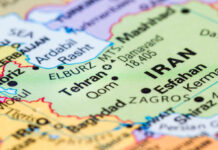
Could a surge in pizza deliveries near the Pentagon be the breadcrumb trail to unmasking secret military operations?
At a Glance
- Pentagon Pizza Report suggests increased Pentagon pizza orders align with military operations.
- Unusual pizza traffic was observed before Israel’s Operation Rising Lion against Iran.
- Concerns arise over whether public transactions compromise military secrets.
- Pentagon Pizza Index theory links government activity to late-night pizza orders.
Prying Eyes on Pizza Pies
A social media account, Pentagon Pizza Report, possibly revealed the U.S.’s knowledge of Israel’s military plans against Iran through an intriguing uptick in pizza shop activity near the Pentagon. On June 12, this curious foot traffic foreshadowed the commencement of Israel’s Operation Rising Lion—with the unassuming pizza slice serving as the uninvited guest now casting light on shadowy briefing hours.
The phenomenon highlights fears of inadvertent security breaches tied to something as benign as a rush for pepperoni. What began as a whimsical theory soon became alarming: can consumer habits expose government machinations, depending on unintentionally candid social media accounts?
Operation Rising Slice
Unfolding on the night of June 12, Israel’s comprehensive attack on Iran’s nuclear capabilities has already sparked debates about the U.S.’s possible foreknowledge. But an intriguing surge in pizza orders at the Pentagon could suggest covert nights of contract deployments and strategic plotting.
Despite Secretary of State Marco Rubio’s denials of any U.S. involvement, the clandestine traffic spike in the pizza world creates a narrative largely ignored by mainstream channels. Instead, Rogue accounts are illuminating the potential lapse of security from the hum drum of pizza Fridays.
Beyond the Crust: Implications
Is it possible that institutions are underestimating the power of quotidian open-source intelligence? The stark implications demand we scrutinize all data points traditionally shunned—like pizza delivery frequency—when discerning national security matters. After Israel’s attack on Iran, a reactive spike in pizza demand near the White House was similarly noted, inferring rippling aftershocks on homeland shores.
As one Twitter user quipped, “If this is true, it’s a national security nightmare with extra cheese.” An extravagant jest, perhaps, yet it underscores a surveillance ecosystem now equipped to bridge the once-perceived chasm between the trivial and the significant.
To doubt the intersection of everyday transactions and pivotal global events is to dismiss a challenge rich in scope and promise. The amalgamation of surprising but true data reminds decision-makers that the keys to substantial geopolitical developments might just be in the pocket lined with pizza grease.

























